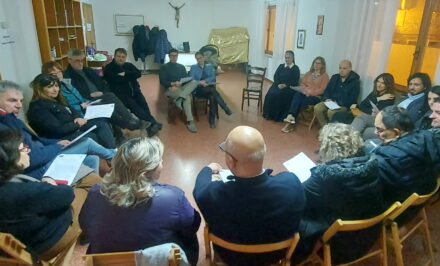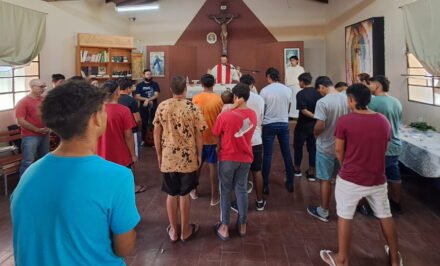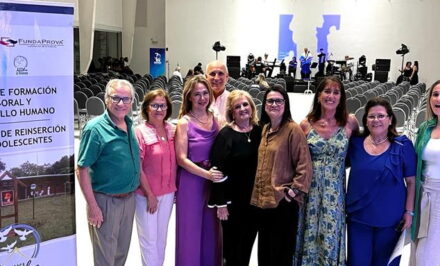
BRAZIL, mda. Gustavo Boacolo Nogueiro da Gama had his 25th birthday this passed August 18, 2014. On this same day, he contacted the editorial office of schoenstatt.org with the intention of motivating many others with something which has changed his life: the Men’s Rosary. This is a great current of masculine spirituality in Brazil and which (this is how he expresses his great desire) should spread to other countries. We spoke with Gustavo about his encounter with Men’s Rosary, its importance for the Church in Brazil and the social commitment it carries with it.
How did Men’s Rosary change your life?
Men’s Rosary was a favorable environment for my conversion, from lukewarm Catholic to fervent Catholic.
What is the importance of Men’s Rosary for the Church in Brazil?
I see Men’s Rosary as a religious movement of major growth in Brazil and which can grow even more: it restores the perception of the ecclesial family, converts adult men (at present there are 1 million members), it supports marriages….. It is colossal! It is nothing other than a breath of the Holy Spirit (John 20, 22) in Brazilian lands.
Considering Aparecida and the continental mission, how would Men’s Rosary connect to the vision and mission of Aparecida?
Men’s Rosary is the explicit, masculine summary of Aparecida. But the general impact in society is deeper, well – as it is said in the Rosary groups – when man prays, the earth trembles and the family prays in unison, it remains united. In regard to this last phrase, coined by the Servant of God, Father Patrick Peyton (creator of the Rosary Crusade for the Family), I recall a study by Retrouvaille International in the 1980’s which confirmed that spouses who pray together daily and go to church on Sundays have a divorce rate of 1 for every 1,105 marriages! The men from the Rosary are not spouses and cannot pray together daily, but they keep united among themselves and united with their wives and children because many of them also began to pray at home.
Pope Francis calls us, from the first day of his pontificate, to go out into the streets, to go to the outskirts, to not only stay in the sacristy without taking to the poor the Good News of Jesus. Is Men’s Rosary a mere devotional initiative contrary to this? If not, how does it inspire missionary activity?
The Rosary, the Bible of the People, is a complete prayer which includes the desire for charity in the reflection on the second joyful mystery (Mary’s visitation to her cousin, Elizabeth). This is reflected in the numerous local activities of help to the poor, sick, elderly and mendicants which the men of the Rosary fulfill, in addition to silent missionary activity which is fruitfulness from conversion. Nevertheless, since Men’s Rosary is an informal movement, hardly anyone is aware – the right hand does not know what the left hand does (Matthew 6, 3).
Why did the Men’s Rosary emerge precisely in Brazil?
Because the Brazilian community historically lacks the sensation of being in a Christian family and ironically possesses an historical Marian background, a legacy from Portuguese colonization.
THE RHMR (Men’s Rosary of the Mother and Queen) is a form of Men’s Rosary and is not the least of them. What characterizes RHMR?
Men’s Rosary of the Mother and Queen has an “identification card” of its members which is the Schoenstatt Shrine. Each one has his own miniature shrine and feels an unbounded joy when he takes it to the weekly meetings!
What impresses you most about Men’s Rosary?
What impresses me most is the in-mass conversions, it reminds me of the Gospel and the Acts of the Apostles.
In which aspects of the life of the Church is the Rosary already strong and in which aspects is there still the potential for growth?
Men’s Rosary is strong in the outskirts, rural areas and in parishes dedicated to Our Lady in Brazil. It is still weak in the wealthy neighborhoods, luxurious condominiums, parishes dedicated to other saints and in indigenous areas and in areas of German colonization.
The Movement can still grow rapidly in countries of Iberian colonization (México, Nicaragua, Angola, Mozambique, etc.) and in Hispanic areas of the USA (Texas, California, Florida). There are already groups in Paraguay. It can grow more slowly in the Anglo-Saxon and Asian countries.
We are an ecclesial movement in which each one has his vocation, but all follow the Covenant, serving the Church and her mission. It is a vision of Church in which the laity have an apostolic role and are led since the Second Vatican Council in which this was unknown in practice. To have as an ideal to be the heart of the Church leads us to be that which we desire and can offer, and in this Church each one has his place and function.
In this context, how do you see Men’s Rosary?
Men’s Rosary makes the layman feel part of the Church and an apostle in his own style, living in abundance (John 10, 10).
When you consider the spreading of Men’s Rosary, which are the elements which must be maintained at all cost, in spite of the different sociological and ecclesial characteristics of the countries?
Men’s Rosary should be excusively masculine, weekly and to pray a group of mysteries of the Rosary (“Terco” as they say in Portuguese). These three points are not negotiable. You can add to it, but you cannot take away anything.
What do you believe and expect from Men’s Rosary?
I believe that:
(1) I believe it is God’s greatest gift to the world since Vatican Council II;
(2) It is the Christian movement which will grow most in the 21st century;
(3) It will become part of masculine, Christian, Catholic identity;
(4) It will restore familiarity in communities and parishes, thus becoming new Ecclesial Base Communities;
(5) It will be a vital source of financial and human resources for works of charity;
(6) It will protect communities from the terrible flagellations of drugs, divorce, abortion, inner divisions, prejudices, materialism, egotism and the abandonment of the Christian faith;
(7) Its effect, with the passing of time, will be perceived much earlier in the life of the Christian;
(8) Men’s Rosary will renew the faith of the priests which will in turn renew the faith of the laity, with some enduring the burdens of others (Galatians 6, 2);
(9) It is an indestrubtible movement since it is informal and decentralized;
(10) It was and is a great joy in and on my Christian path, not only because of what it did in my life, but because of what it has done in the lives of dozens of my friends and in a million Brazilians.
How do you want the readers of this interview to respond, in relation to Men’s Rosary?
I desire that groups of Men’s Rosary be created in their communities, only this.

Contact: gustavobndg@gmail.com
Original: Spanish – Translation: Carlos Cantú, Schoenstatt Family Federation, La Feria, Texas USA 08272014
![]()













